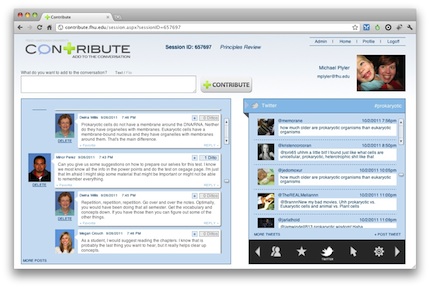Freed-Hardeman U Develops Back-Channel Capture Service
- By Dian Schaffhauser
- 10/11/11
A small private college in Tennessee has developed an application that allows users to communicate and collaborate online and then capture that "back-channel" conversation and its artifacts. Henderson-based Freed-Hardeman University launched Contribute in August on its campus and is now allowing non-university people to set up groups and use it too.
"Our hope in the classroom is that it will add to the teaching and learning process and provide a way for those that are often timid in class--as far as speaking up or contributing to the teaching and learning process--a way to do so in which they are more comfortable," said Mark Scott, vice president of technology and innovation. "Everyone can share thoughts, files, document, videos, feedback, etc. in real time as well as archive the system for later review."
The initial idea behind the application was to provide faculty members with a set of features that would enhance student experiences in the classroom. In addition to that backchannel stream, the program also lets users:
- See who's online;
- Save favorites among personal bookmarks of participant posts;
- Participate in Twitter (by allowing hashtag searches to supplement a current session);
- Maintain a repository stream of all URLs posted;
- Create a word or tag cloud;
- Do audience polling;
- Display replies to user posts;
- "Ditto" stream posts when a participant agrees with a particular comment; and
- Embed links, files, and images into conversations.

Freed-Hardeman University's Contribute grew out of an initiative to provide education technologies for use inside and outside the classroom. |
Users can create their own backchannel sessions and send themselves archives of sessions they've participated in. Users can add to group conversations via mobile devices and the iPad and get into Contribute through their Freed-Hardeman account login or via Facebook or Google. They can also create a native Contribute account.
Contribute grew out of a university initiative called the iKnow Application Suite, which provides a set of tools for use inside and outside the classroom. The school runs a program that supplies all 2,000 students with Apple MacBook Pros. Next, it'll be adding iPads to the Apple device mix on campus.
"The ability to maintain real-time online conversation alongside live spoken presentation is an ever-growing trend," said Michael Plyler, university Webmaster and creator of the product. "To build on the success of our iKnow Application Suite, we decided in the summer of 2010 to build a backchannel application for use in the classroom. Our expectation was to create a way to capture 'everything else' going on in a presentation that wasn't coming from the speaker. We also wanted to make it easy for participants to add to the conversation that goes on in the backchannel."
During the development of Contribute, both faculty and students participated by providing feedback and helping with development.
"The simplicity of Contribute is what makes it a powerful engagement tool," noted A.B White, instructional technologist. "Contribute enables participants to focus on the conversation, not the user interface. The tools that allow participants to examine the conversation and draw conclusions are simple to use as well. Above all, the application makes it easy to include a small group of individuals, a class of students, or thousands of people located around the world in the conversation."
Computer science major Lance Williams, a senior at the university, said participating in the programming of the application allowed him to see "how the courses I've taken in my career at Freed are truly useful.... The experience has been tremendous for me in understanding the difference in homework and real-world work. I had to deal with harsher deadlines and tougher problems, while knowing that my work didn't only affect me but also the potential of this program and all its future users. I thoroughly enjoyed the process of seeing through the design, development, testing, releasing, and updating the app."
Greg Massey, who chairs the history and political science department, said he found Contribute valuable in getting more participation among students. "In one of my senior-level classes, we chose not to meet face-to-face, but instead discussed a book we're reading in a session on Contribute," he said. "In class discussions, normally only a few students participate. In our chat session on Contribute, everybody shared ideas. Students who're normally shy in the classroom really opened up and posted great comments."
Massey said he found the ability to bring outside sources into the discussion useful. "At one point in this class, I posted a link to an Internet article; the students read over it, and then we discussed it. I plan to incorporate Contribute in all my classes. In addition to using Contribute in discussions, it will help me assess whether my students are getting the main points of a lecture."
Another faculty member, Dwina Willis, an associate professor who teaches courses in biology and the Bible, said she found Contribute useful during a test review session. "Students who might not have asked a question in class felt free to ask questions in this format. They could even ask for clarification and receive real time answers." She added that she plans to use the format again during her next review session.
The university has opened the use of Contribute to anybody who would like to try it as part of their teaching at contribute.fhu.edu.
Should it become wildly popular, said IT leader Scott, "We plan to monitor its servers and begin throttling public logins when necessary. Eventually, if the load becomes too large, we would move to a public hosting provider that could handle high volume traffic."